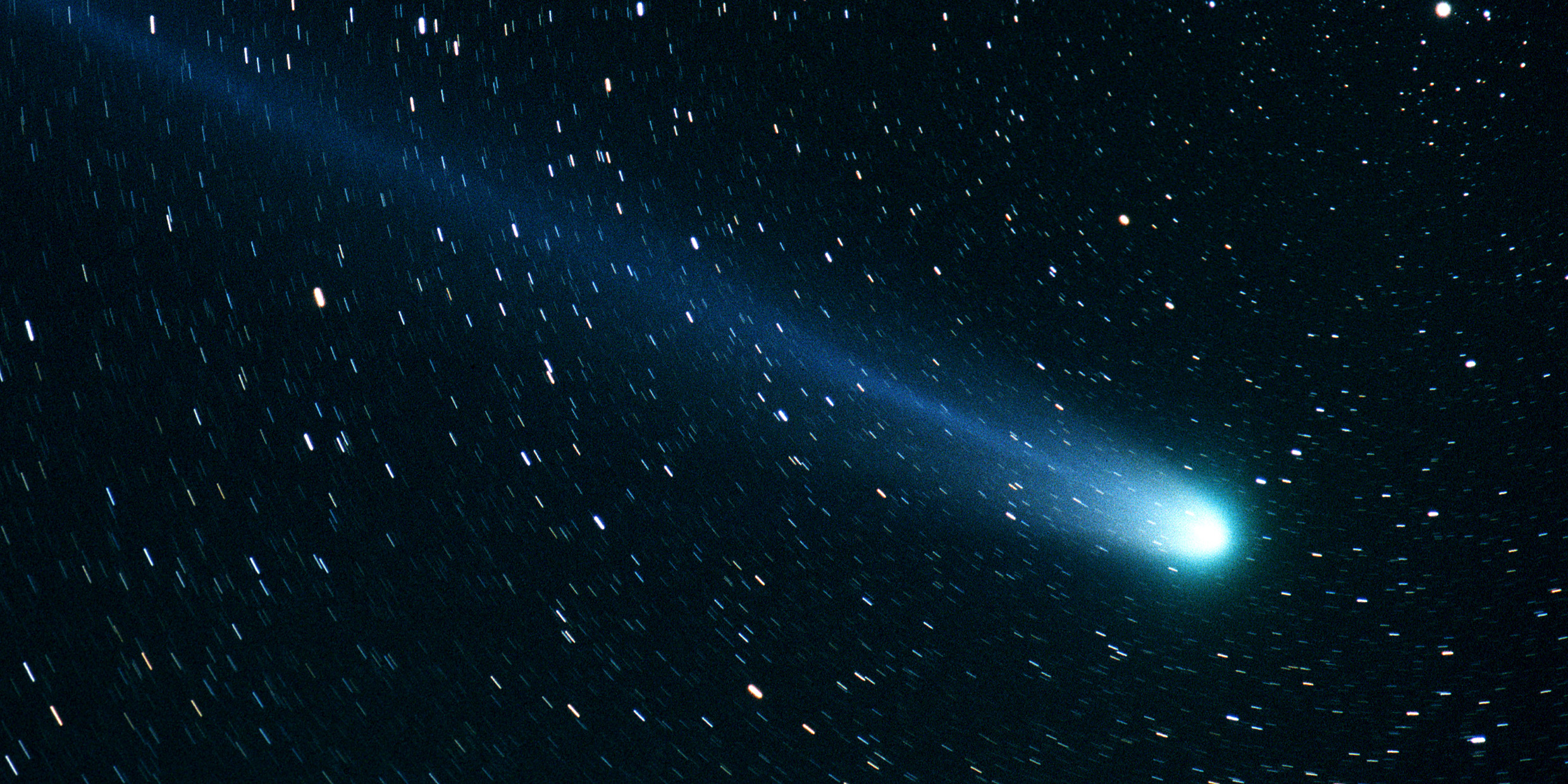Originally published 15 April 1996
We watched the long slide of Comet Hyakutake from the dark southeastern sky, up across the north pole, into the light of the setting sun. It was a journey of exceptional duration, long enough to let the comet become a familiar part of the environment. By the time it slipped into the twilight, it seemed as if it had been with us forever.
The comet was easily visible to the naked eye. On the best night we saw the tail extending a full handspan across the sky, like the faint smudge of a finger on a windowpane. Some observers reported seeing a hint of aquamarine.
On almost every clear night we were at the college observatory, a crowd of eager watchers drawn by the campus grapevine. Apparently, comets have lost none of their old power to excite the imagination.
A few folks took a look at the blur in the sky and said, disappointedly, “That’s it?” They were expecting, I suppose, swoosh and glitter. But most were genuinely excited to see the comet, and especially to stand in the cold dark with others who had come to celebrate nature’s capacity to surprise.
Not swoosh and glitter, just faint light and beauty. We remembered what turn-of-the-century naturalist John Burroughs wrote: “The night does not come with fruits and flowers and bread and meat; it comes with stars and stardust, with mystery and nirvana.”
I first saw Hyakutake from an island in the Bahamas in mid-March. I wasn’t looking for it; I hadn’t expected the comet to become a naked eye object until later on, and I was used to comets being overtaken by their hype. But there it was, an easy naked-eye object in Virgo.
At first I thought I might be looking at M5, a globular cluster of stars purportedly visible to the unaided eye under perfect conditions and a permanent resident of that part of the sky. But the next night, when the blur had moved, it was obvious that Hyakutake was on the way and that it was going to be a winner.
Night by night it grew brighter, flirting with Arcturus, skimming the Dipper, showing hints of tail. We watched it with binoculars and telescope, but the unaided eye was the best instrument of all, allowing the comet its context, a backdrop of stars, an abyss of darkness.
Best of all was the evening of April 3, when we forsook the observatory for a broad dark field where we watched the moon rise in eclipse, a spooky pink pearl. The comet was in the northwest, showing a degree of tail. Dazzling Venus shepherded the Pleiades. Meteors streaked the firmament. It was, by all accounts, a magical evening.
We are a culture of swoosh and glitter. Generally, it takes a blockbuster to gain our attention. Superbowls. Mega-events. To bring us out at night and away from our big-screened TVs, one would have supposed the sky would have to erupt in celestial pyrotechnics.
Instead, the comet whispered, and the crowd was there to listen. Hyakutake spoke sweet nothings; we cocked our ears. A pale smudge on the windowpane of night; we nodded approvingly. With sublime discretion, the comet crossed the deep, trailing a wake of exquisite fineness, and the audience was sitting on the edge of our seats.
So maybe we are not yet completely oblivious to nature’s subtle gifts. John Burroughs said that “the good observer of nature exists in fragments, a trait here and a trait there.” And again, “one secret of success in observing nature is [a] capacity to take a hint.” Watching the comet, we waited for traits and took the hints.
And what we saw was a story of our own beginnings. Comets are the stuff of which the solar system was born, preserved in the deep- freeze of the trans-Pluto realm. Volatile compounds. Carbon-based molecules. Amino acids. The building blocks of life.
Some scientists believe that the materials of life were rained down upon the Earth by comets in the early eons of the solar system, 4 billion years ago. A few have suggested that life might have come to our planet on a comet, as primitive microorganisms.
Watching the faint light of Hyakutake, we were witness to the glow of life in the dark abyss of the galaxies. We are children of a universe that is majestic beyond our knowing, full of wonders of which we can only dream. Of all of this, the comet is a hint.
When night’s faint lights revealed themselves to Burroughs, his thoughts, he wrote, went “like a lightning flash” into the abyss, and then the veil was drawn again. It was just as well, he wrote, to have such faint and fleeting revelations of the deep night: “To have it ever present with one in all its naked grandeur would perhaps be more than we could bear.”



